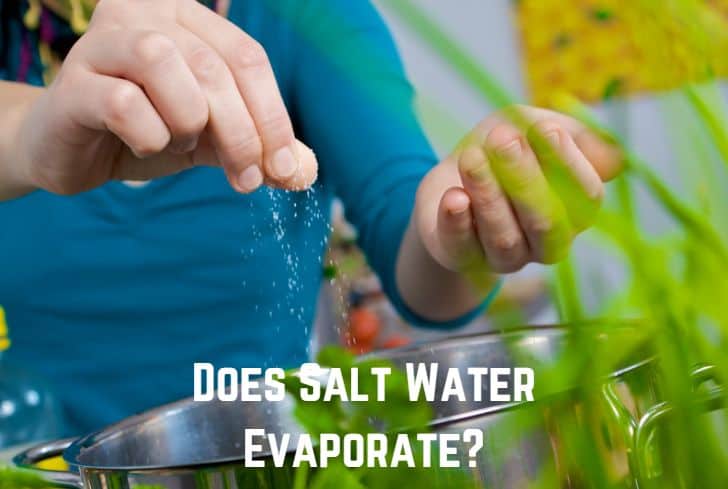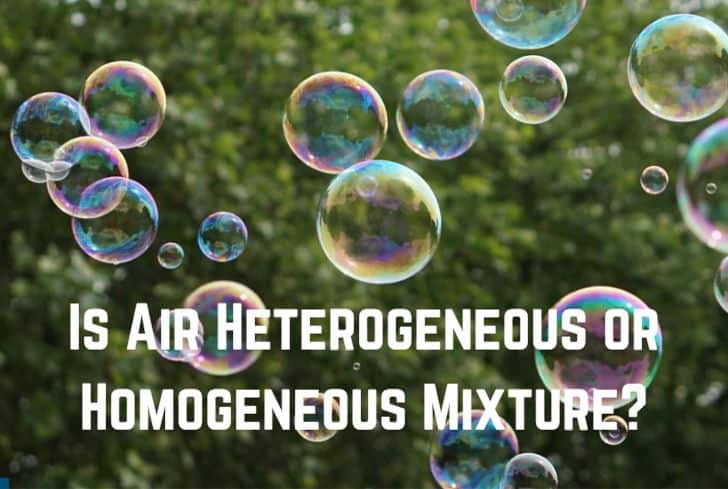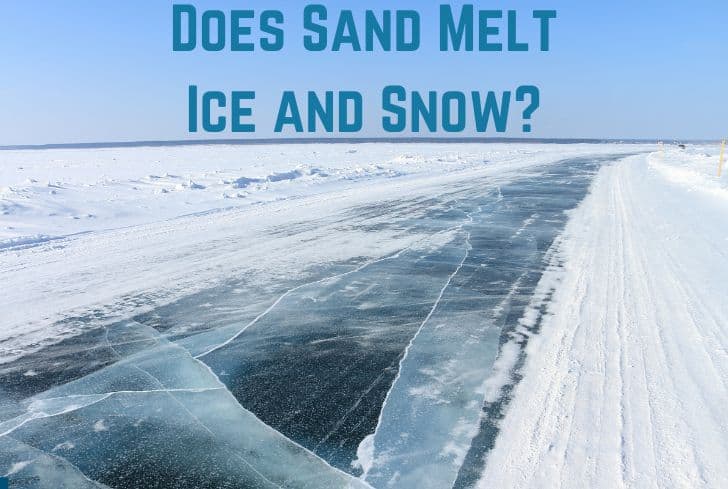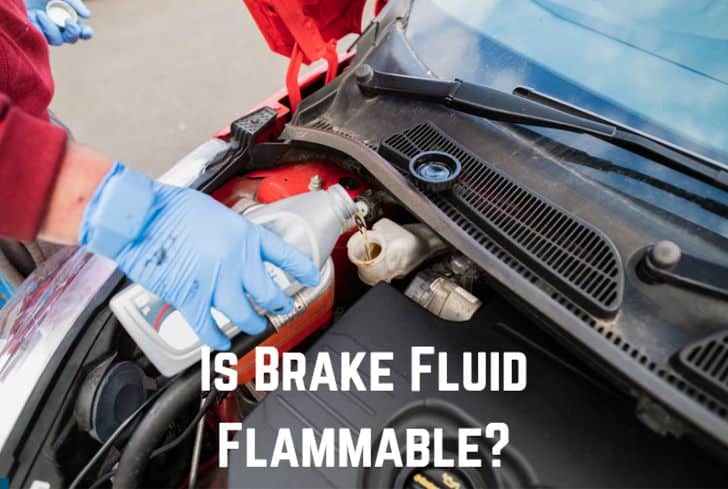Does Salt Water Evaporate?

When adding salt, you’ll notice changes in the water’s chemical and physical characteristics. Compared to salt water, pure water will behave differently. The water molecules will bond with the salt and might be displaced. Even at room temperature, pure water commonly evaporates. But does the amount of salt present affect how quickly water evaporates? Do saltwater evaporations occur?
That is the first question we shall be answering in this article. We’ll also tell you whether salt affects how quickly saltwater evaporates, between saltwater and freshwater, which one evaporates faster, and how long saltwater takes to evaporate. Finally, you’ll discover whether salt evaporates with water and if pool and seawater evaporate.
Does Salt Water Evaporate?
Salt water does evaporate. The salt molecules, however, will remain behind as only the water molecules evaporate. Na+ and Cl-, two electrically charged ions (atoms) that make up salt, tend to stick together. These two types of ions are too heavy to evaporate. Thus, salt is left over after the water evaporates.
Saltwater is a liquid solution; the water molecules surround and keep the salt molecules apart. Temperature changes and vapor pressure causes the water molecules to evaporate. As they evaporate, the water molecules at the surface turn into vapor. Water molecules will continue to rise to the surface and evaporate.
Water keeps the salt molecules from crystallizing because it is present. Yet, as water evaporates, water molecules in the saline solution decrease. The salt molecules are still present after all the water has evaporated and can now form crystals.
See what happens to salt when all the water evaporates: How to separate Salt Solution by Evaporation Science Experiment?
How Does Salt Affect the Evaporation of Water?
The vapor pressure of water decreases when salt and water molecules mix. Thus, fewer water molecules can rise to the solution’s surface and escape. Only the molecules on the surface can evaporate. The area the salt ions occupy on the surface limits how many water molecules can fit on the surface.
Water molecules are attracted to salt ions, another way salt affects water evaporation. There is a strong ionic attraction between salt ions and water molecules. The water molecules in salt water become less free to evaporate than in pure water because of hydration energy. The attraction makes it challenging for the water molecules to escape from the salt molecules.
Does Salt Water Evaporate Faster Than Freshwater?
A saltwater solution evaporates more slowly than a freshwater solution. The presence of salt ions decreases the number of water molecules at the surface. The Na+ and Cl- ions in salt displace some of the water molecules that would have been on the surface. Freshwater’s surface is entirely composed of water molecules, which evaporate quickly.
Hence, the evaporation rate decreases with increasing salt concentration in salt water. The chemical connection between the salt ions is greater in salt water, another factor contributing to its slower evaporation. Due to their weaker bonds, water molecules will separate and rise to the surface more quickly.
The water molecules attached to the salt ions will take more kinetic energy to evaporate. Since the salt ions physically prevent water molecules from freely moving to the surface, the evaporation rate is lower. Evaporation won’t happen if the water molecules can’t reach the surface.
How Long Does It Take for Saltwater to Evaporate?
The salt in salt water does not evaporate. Only the water will. Many factors affect the time it takes for water and salt to separate. The first one is the surface area that the salt water occupies. Saltwater in a cup will take a short time to evaporate than saltwater in a shallow pond. A larger surface area means more water molecules will be at the top.
Other factors affect how long saltwater takes to evaporate, as we highlight below:
- Salt Concentration
The time it takes for saltwater to evaporate depends on the salt concentration. When salt is more concentrated, the water molecules will have more difficulty escaping from the salt ions and rising to the surface.
How long the water molecules reach the surface will determine the time for evaporation. It will take longer if the water molecules have to pass through a lot of salt molecules.
- Temperatures
The evaporation time will also be affected by the air temp. Are you raising the temperature using an external source, such as a stove? Or are you relying on the sun’s heat only? If you use an external heat source, the water molecules will evaporate faster.
- Surface depth
Water molecules will take longer to evaporate where the surface is deeper than shallow. It will take longer for all the water molecules to rise to the top. The shallow saltwater areas will dry up more quickly than the deep areas.
Does Salt Evaporate With Water?
The water does not evaporate with salt in it. Water will evaporate and leave behind the salt molecules because it has a lower boiling point than sodium chloride. Salt is an ionic compound with powerful bonding. The NaCl ions bond with related molecules that solidify and do not evaporate when the water H2O molecules evaporate.
The salt will form a deposit where the water is, crystallizing if the concentration is high.
Does Pool Water Evaporate?
In swimming pools, it’s standard for water to evaporate. Yet, humidity, air temperature, wind speed, and pool surface area will affect how quickly pool water evaporates. Pools will evaporate water more rapidly on windy days or in windy locations than on calm days or in serene places. The wind clears the air, relieving pressure on the water and accelerating pool evaporation.
The wind is most frequent in mountainous places, coastal regions, extensive plains, and lakes.
Pools in dry climates lose water more quickly than those in humid ones. There is a limit to the amount of water that air can hold. As a result, the water evaporates more slowly, the more humid the area around your pool.
A pool with a smaller surface area will lose less water than a larger surface area. Due to the temperature difference, a heated pool will also lose more water than a non-heated pool. The evaporation rate will increase with heat, whether natural or artificial.
The most water that should evaporate from your pool is 2 millimeters to 2 inches. More than that indicates that your pool leaks rather than evaporate. However, you’ll need to consider the effects of each of the previously listed factors. Here is a swimming pool water loss calculator. You can also use the bucket test.
Does Seawater Evaporate?
Salt crystals are left behind after seawater evaporates. People can use shallow ponds where seawater has evaporated as a source of salt. You’ll have to purify the salt first before using it at home. On a sunny day, the temperatures are high, which causes the water to evaporate. Evaporated water creates clouds that eventually become snow, rain, or sleet.
The hydrologic cycle refers to the process through which water from the sea, ocean, or the earth evaporates and falls as rain or snow. Seawater contains salt but is not chemically bound; the salt dissolves in the water. Only pure water will fall back as rain or snow when water evaporates to form precipitation. All impurities, including salt, are left on the surface.
However, when air blows across the sea, it contains salt particles. Only the water evaporates when the airborne seawater particles are blowing across. The salt particles are in the air or land on things. Due to these salt particles, cars are more likely to show signs of rust in areas near the sea. It also shows that only pure water evaporates and falls back.
Natural water bodies contain different salt types, such as:
- Potassium chloride,
- Sodium chloride,
- Magnesium chloride,
- Magnesium bromide,
- Calcium carbonate,
- Magnesium sulfate.
The type of salt present will determine the effect of seawater evaporation. At differing salinities, different salts become insoluble. When salt loses its ability to dissolve, it separates from the solution and crystallizes. The bulk of the salt in seawater is sodium chloride(NaCl).
Frequently Asked Questions
How do you turn salt water into freshwater?
There are two different ways you can convert saltwater into freshwater. Water filters perform an excellent job of trapping the salt particles as the water passes through. The water filter contains a special membrane known as reverse osmosis.
The other option is to boil the water, allow it to evaporate, and discard the salt. You can then collect the water and condense it back. The method is called desalination.
Does salt dissolve in cold water?
Salt does not dissolve as easily in cold water compared to warm water. The tighter water molecules in cold water prevent the salt from dissolving. Conversely, warm water molecules have greater space, enabling the salt molecules to fit.
Conclusion
The salt molecules are left behind as the water molecules in the saltwater solution evaporate. Na+ and Cl-, which make up salt, adhere to one another and render salt too heavy to rise to the surface. Since salt molecules make it physically challenging for the water molecules to reach the surface, freshwater evaporates more quickly than salt water.
The salt concentration, air temperature, and surface depth are a few factors that will affect how long saltwater takes to evaporate. Salt particles do not evaporate along with molecules of water. The evaporation of pool water will vary depending on the air temperature, humidity, surface area, and wind speed.






